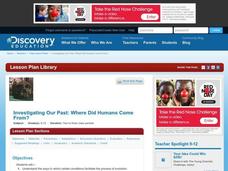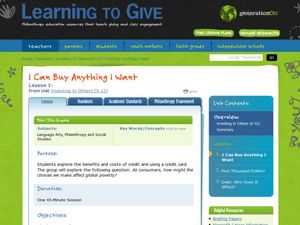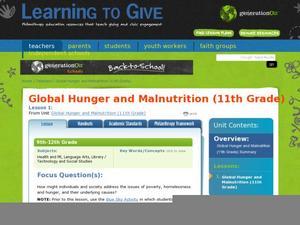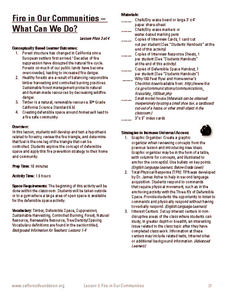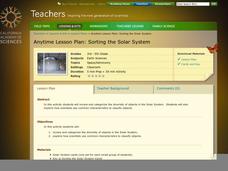Curated OER
Skill Building: Alphabet Poem
Amateur poets explore alphabetical poetry. They choose a topic and brainstorm vocabulary that relates to the topic using each letter of the alphabet. The class then generates ideas for a group alphabet poem. After creating one as a whole...
Curated OER
Investigating Our Past: Where Did Humans Come From?
Investigate the theories of human evolution. In this research based lesson, learners research and discuss how geographic isolation, interbreeding, generalization, and specialization are factors in the history of humans. Groups work...
Curated OER
Analyzing Two or More Nonfiction Texts
How does recognizing the author's purpose help you draw conclusions about a topic? Using two articles (both are attached), learners brainstorm why each author wrote each article. Are their purposes similar or different? Learners use a...
Curated OER
Is Portland, Oregon Experiencing Global Warming?
Students use data to determine if the climate in Portland has changed over the years. In this weather lesson students complete line graphs and study long wave radiation.
Curated OER
So Much Water, So Little to Drink
Students explore salt and fresh water. In this water lesson plan, students investigate the amount of Earth covered by water. Students compare the amounts of salt water to fresh water. Students create a visual representation to aid...
Curated OER
Starch
Students examine the basics of starch and how it is used in food. In this photosynthesis instructional activity students experiment with variables that affect starch production in photosynthesis.
Curated OER
Matrix Analysis of Networks
Explore the connection between a finite graph, a directed graph, and a matrix. Graph lines and identify the relationship of matrices in real-world scenarios. Then use this information to work with a partner to plan and design a...
Curated OER
Prime Factorization: Finding Factors in the Fifth Grade
The lesson starts out with a brain drain, which is a great way to get students to activate prior knowledge and build lasting connections. They tell everything they know about prime factorization, use their knowledge to...
Curated OER
Symmetry in Children's Art Experiences
Read between the lines of symmetry to make important connections between math, art, culture, and nature.
Curated OER
Lesson 23: Reproduction - Day 5: Birth Control
High schoolers with mild to moderate disabilities discuss human reproduction and the importance of preventing pregnancy. They review reproductive anatomy, sexual decision making, and what birth control is. The lesson concludes with a...
Curated OER
I Can Buy Anything I Want: Consumer Debt and Social Responsibility
A clear, comprehensive overview of consumer debt, credit, interest, international currency, and social responsibility, this 45-minute session falters in the application stage. You'll need to create a way for learners to demonstrate their...
Curated OER
Art Basics Scavenger Hunt
Hand out this worksheet and lead your class on a scavenger hunt. Pupils look for examples of shape, form, balance, pattern, perspective, space, and depth. They draw and write about the examples they've found. A great resource to add...
Curated OER
Introduce Vocabulary: A Day at the Apple Orchard (Faulkner and Krawsky)
If your class is reading A Day at the Apple Orchard by Megan Faulkner, be sure to use this guide for vocabulary in context. Go over the orchard-related terms (cycle, harvest, orchard, pollen, and ripen) before reading...
Curated OER
Introduce Vocabulary: Fancy Nancy and the Posh Puppy (O'Connor)
Although this vocabulary-in-context activity could be used with any text, it's a piece of cake if you're reading Jane O'Connor's Fancy Nancy and the Posh Puppy. What new words will pupils learn here? Find comprehension questions for...
Curated OER
Introduce Vocabulary: Hot Air: The (Mostly) True Story of the First Hot-Air Balloon Ride (Priceman)
What a fun way to explore new vocabulary words! Marjorie Priceman's book Hot Air: The (Mostly) True Story of the First Hot-Air Balloon Ride offers plenty of new words for scholars to learn in context: amateur, assembled,...
Curated OER
Introduce Vocabulary: How Do Dinosaurs Go To School? (Yolen)
Dinosaurs don't go to school...but what if they did? Use Jane Yolen's book How Do Dinosaurs Go To School to explore vocabulary in context. Find this on YouTube if you don't have the text on hand. These in-text words give some...
Learning to Give
It's Never Too Late: Air Quality
What are the causes and effects of pollutants on the quality of the air we breathe? Groups research emission standards, emission controls, career opportunities in the area of air quality control, and things government and individuals can...
Curated OER
Global Hunger and Malnutrition
Is there a difference between hunger and malnutrtion? Is this a problem only in third world countries? How does hunger and malnutrition affect the community? Why do these problems exist when the world produces enough food to feed...
Curated OER
Color Scheme Acrylic Painting Self-Assessment
Being a good artist means being able to critique your own work. Here young painters will take a short quiz on color schemes in acrylic painting and then reflect on their use of color in a recently completed piece. A great worksheet for...
Forest Foundation
Fire - How Does it Relate to You?
Forest fires can be a necessary step in keeping a forest healthy, but what happens when they get out of control? Learners investigate the causes and effects of forest fires in two specific areas, culminating in a report about the ways...
Forest Foundation
Fire in Our Communities - What Can We Do?
Learn about defensible space and renewable resources with a lesson about forest fires. After exploring the ways that humans have impacted the environment, kids conduct mock interviews about differing points of view in the conservation...
California Academy of Science
Sorting the Solar System
Scientists are always sorting and classifying objects based on their characteristics. In a hands-on learning activity, young space explorers work together to categorize solar system cards based on their properties. It is up to the...
North Carolina State University
Integrating Your Research
Employ this resource to expand efficient ideas on how to present and organize activities that describe how researchers can implement their research by using direct quotes, paraphrasing, and summarizing—without plagiarizing. Activities...
Virginia Department of Education
Creating Thesis Sentences
Growing writers explore what it takes to develop and support a thesis statement with pre-fabricated ideas provided by the Virginia Department of Education. Learners take notes on what makes a thesis statement and a topic sentence, and...
Other popular searches
- Definition Paper Mathematics
- Definition Paper Natural
- Writing a Definition Paper
- Definition Paper Mthematics
- Extended Definition Paper



